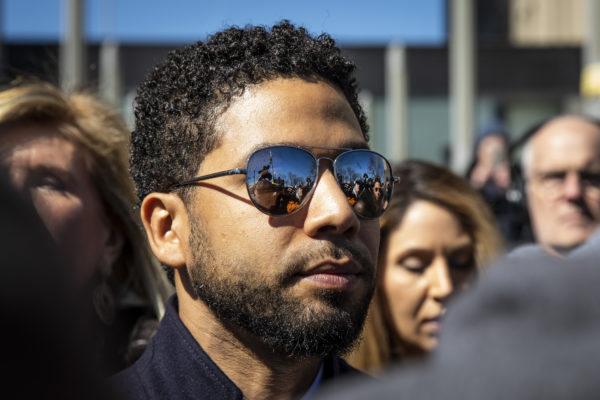In the two months since Jussie Smollett reported a late-night attack by assailants shouting racial and anti-gay slurs, the “Empire” actor and activist went from victim to defendant. Police and many in the black community rallied to his defense before condemning his account as a hoax.
On Tuesday, Smollett was a defendant no more after prosecutors dropped the criminal case that had loomed over him for weeks. He expressed gratitude to fans and maintained his version of events.

Actor Jussie Smollett leaves the Leighton Criminal Courthouse in Chicago on Tuesday March 26, 2019, after prosecutors dropped all charges against him. (Ashlee Rezin/Sun-Times/Chicago Sun-Times via AP)
“I am a man of faith, and I am a man that has knowledge of my history. And I would not bring my family, our lives or the movement through a fire like this. I just wouldn’t,” he told reporters after an emergency court hearing that cleared his record.
The decision to drop charges has sparked a backlash that prompted the actor’s attorney to issue a blistering statement Wednesday accusing Chicago officials and police of trying to “smear” Smollett even after the case is closed.
“We are disappointed the local authorities have continued their campaign against Jussie Smollett after the charges against him have been dropped,” said attorney Patricia Brown Holmes, “We should all allow Mr. Smollett to move on with his life as a free citizen.”
Smollett’s bizarre saga has shaken the public trust, exposed the country’s deep racial wounds and damaged his acting career and his advocacy for African-Americans and LGBT issues. Left behind are hurt and blame and many questions that will likely go unanswered.
“Black people will see this as a black mark,” Georgetown University sociologist Michael Eric Dyson said. “Given what the consequences are, this does not help anybody. It doesn’t help the police department. It doesn’t help black activism. It doesn’t help Mr. Smollett. Everybody loses and nobody wins.”
Smollett, who is black and gay, reported to Chicago police that he was attacked around 2 a.m. on Jan. 29 on his way home from a sandwich shop. He said his attackers threw some kind of chemical on him, looped a rope around his neck and beat him up while hurling slurs and yelling “This is MAGA country,” a reference to President Donald Trump’s campaign slogan, “Make America Great Again.”
The initial reports were frightening for many people, prompting a rush to judgment led in large part by black Americans and fueled by social media, with politicians, entertainers and the general public weighing in.
“Social media allows all of us to be skeptics, and it allows all of us to ask questions and probe in public,” said Rashad Robinson, executive director of the online civil rights organization Color of Change. “There’s the incentive to be first, to be loud, to be different in order to drive your visibility. The information that first came out was so visceral and scary for so many.”
Within days, a new narrative emerged. Investigators claimed Smollett made a false report to police because he was unhappy with his pay on the Fox television show and believed the attention would promote his career.
Since the charges were dropped, many of those same voices have been reserved, reluctant to chime in or exhausted by the whiplash developments. Their silence stood in contrast to both outgoing Chicago Mayor Rahm Emanuel and Police Superintendent Eddie Johnson, who blasted Smollett as an opportunist who conjured a hate crime to enrich himself at the expense of the city and actual victims.
“This casts a shadow of whether they’re telling the truth, and he did this all in the name of self-promotion,” Emanuel told reporters at a news conference. “And he used the laws of the hate crime legislation that all of us collectively over years have put on the books to stand up to be the values that embody what we believe in. This is a whitewash of justice.”
It was a surreal moment for some activists still angered over Emanuel’s handling of the 2014 Laquan McDonald case in which a Chicago police officer fatally shot a black teen 16 times and city officials withheld video footage of the killing for months. The shooting and cover-up were on the minds of many in the black community who questioned whether Smollett would be treated fairly by the department.
But Tuesday’s developments left some observers wondering if, in the end, Smollett’s celebrity trumped his race. Prosecutors dismissed all 16 felony counts and expunged his record. In return, authorities said, he agreed to forfeit the $10,000 he put up to get out of jail, and he completed community service.
“Only black celebrities, and only occasionally, are treated with the same kind of privilege that white people who are anonymous can take for granted,” Dyson said. “Due process would be to let the facts come out. We had a public hearing with little evidence.”
Without a resolution by jury, the case returns to the court of public opinion. Conservatives are already decrying what they perceive as hypocrisy from Black Lives Matter supporters. Fox News host Tucker Carlson addressed the situation in his Tuesday night monologue: Smollett “may claim to fight for marginalized people, but he is not one of them. In fact, he occupies the highest rank of privilege in our society. He is above the law.”
“Increasingly, there seem to be quite a few people like that in this country,” Carlson continued. “You will recognize them because they are the ones always lecturing you about how bigoted and unfair America is. What they don’t understand is that they are proving that point.”